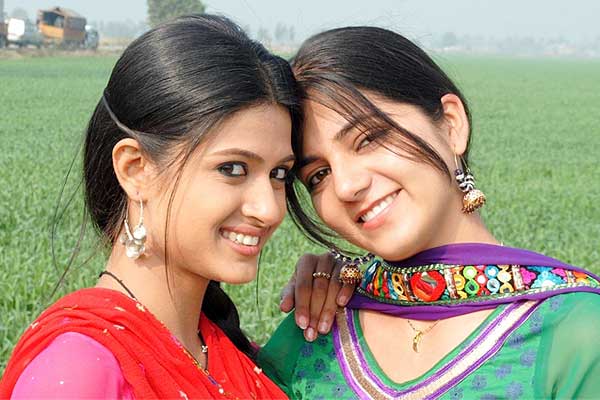Dollar dreams and the fixation to net an NRI groom plagues the whole of India and that includes rural India too. <em><a href=http://www.tellychakkar.com/news/colors-issues-media-statement-pertaining-controversy-over-title-its-new-show-gurbani-opts-name>Bani – Ishq da Kalma</a></em> (Mystic Entertainment and Colosceum Media) is based on the stories of some 30,000 Indian brides who have been forsaken by their NRI husbands.
Submitted by
TellychakkarTeam
on
Wed, 03/20/2013 - 17:15

Dollar dreams and the fixation to net an NRI groom plagues the whole of India and that includes rural India too. Bani – Ishq da Kalma (Mystic Entertainment and Colosceum Media) is based on the stories of some 30,000 Indian brides who have been forsaken by their NRI husbands.
The opening scene of Rano (Navni Parihar) haplessly looking into the compartments of every passing train hoping to see her husband return to her and accept her as her lawfully wedded bride was impressive. The actress claims that she was moved to tears by this scene. When there is a possibility that her husband’s whereabouts may be revealed at the click of a mouse button through a Google search or by a thorough police or detective investigation; it’s tragic that this lady waits on at the station. It’s good that it will be shown later on the show how to track these runaway grooms.
Rano who is dressed as a newly-wed bride even 20 years after her husband had left her reminds us of the quirky Miss Havisham in Charles Dicken’s Great Expectations who was dressed in wedding finery even years after her suitor had called off the wedding at the eleventh hour. Miss Havisham had thereby grown to hate all men and wanted to see them suffer. Rano is however a conventional traditional Indian woman who in her heart still seems to be wedded to a man who has walked out on her. Rano’s character has a lot of promise and the creators can bestow her with an eccentric streak just like Dickens had to Miss Havisham.
It’s nice that the creatives have blended both traditionalism and modernity in Gurbani (Shefali Shah). It seems that she will not turn out to be a demure and soft spoken bahu. She is free-spirited like her cousin and bosom buddy Rajji (Neha Bagga). The close bond between them is well etched out.
Gurbani and Rajji’s families are at war. It was innovative to see the girls communicating with one another when the other family members are asleep at night through two dislocated bricks in the wall which they remove at their appointed conference hour at night. The camera pans on both the households bifurcated by a wall simultaneously showing what both the families are doing- this technique is quite unique. It was a pleasure to see the innocent child Happy Singh blissfully communicating with both the rival families, sometimes even acting as a buffer between them.
The Sikh Punjabi culture has been lucidly and beautifully etched out. It was nice to see the generosity of the characters in serving juices to the passersby. It was ironic to see characters who are so generous still harbouring past grudges when they enter into a heated argument while distributing the drinks.
Regarding the portrayal of NRIs and the dreams to settle on foreign shores, the serial does seem to be somewhat one-sided. The creatives do claim that they will show good NRIs in future though. In forthcoming episodes when they show an NRI character who is visiting her native village demanding that she has mineral water instead of well water; let’s hope that there’s no moralising associated with it. Even urban Indians visiting a village may insist for the same for health reasons. Refusing to have water directly from the well shouldn’t be typecast for being snobbish and losing one’s simplicity.
Rajji’s father Nirvali (Suraj Thapa) returned from Canada after six months as he found life tough out there. Manjeet (Aarti Khandpal) who lives in Canada will later turn out to be a narrow minded woman who pretends to be modern. Moreover, she will go on praising Canada and degrading India.
Whereas it’s true that there are NRIs who aren’t internally modern and try to imbibe a garrulous outward show of modernity; there are also many non resident Indians who have a blend of Indian and modern values, have made India proud and speak good of India wherever they go. Some Indians settle abroad as because there are better amenities and professional opportunities abroad. Maybe, the serial should also focus on how India can upgrade itself to avoid brain drain to foreign nations. An NRI who is happy living abroad is not a not-so-nice person all the time. An NRI who dislikes life abroad isn’t necessarily pious.
It’s rightly pointed out in the show one should get to know the person properly before tying the knot instead of getting carried away by the NRI status. This should be true for every marriage and not just NRIs. In our soaps we don’t say the same when we show arranged marriages between Indian citizens who get to know one another on the wedding night. Also, many Indian residents must have abandoned their wives too but a greater hue and cry is raised in media if NRIs do the same. Soaps should be unbiased in their approach.
The cinematography of Bani – Ishq da Kalma is impressive. There were some nice pastoral scenes in the background of the sunrise, noon day sun and sun set. The jewellery and costumes have been well designed. However, villagers dress simply and don’t wear so much of jewellery. They aren’t affluent enough to wear heavy expensive ornaments. However all soaps on rural India have characters wearing expensive jewellery.
The interiors of village huts are simple and don’t look like the village hut shown in the soap. Once again, the art direction of all rural homes in Hindi GECs follow this style. Nevertheless, the art directors have been realistic in showing the villagers keeping their clothes in a trunk instead of wardrobes and a Sikh calendar hung on the wall. It also added verisimilitude when the characters served juice in used mineral water bottles to the passersby. The village with all its vibrant colours, bestowed a quintessential Mulk Raj Anand touch to the serial.
It’s disappointing that there were unreasonable issues raised on the erstwhile name of the show Gurbani, which means compositions of Sikh gurus, which is the name of the lead protagonist which had to be changed as certain Sikh groups raised an objection over it. Freedom of expression is really threatened in India.
It would be nice if we saw more of the Sufi singer Harshdeep Kaur, maybe at the end of every episode, singing the epilogue of every episode. Bani – Ishq da Kalma has had a satisfactory opening. However it doesn’t seem to be as good as Veera also aired at 10:30pm and set in rural Punjab on Colors’ rival channel Star Plus. The show may not be able to beat Balika Vadhu, Colors’ iconic show set in rural India.
Like

0
Love

0
Haha

0
Yay

0
Wow

0
Sad

0
Angry

0










Add new comment